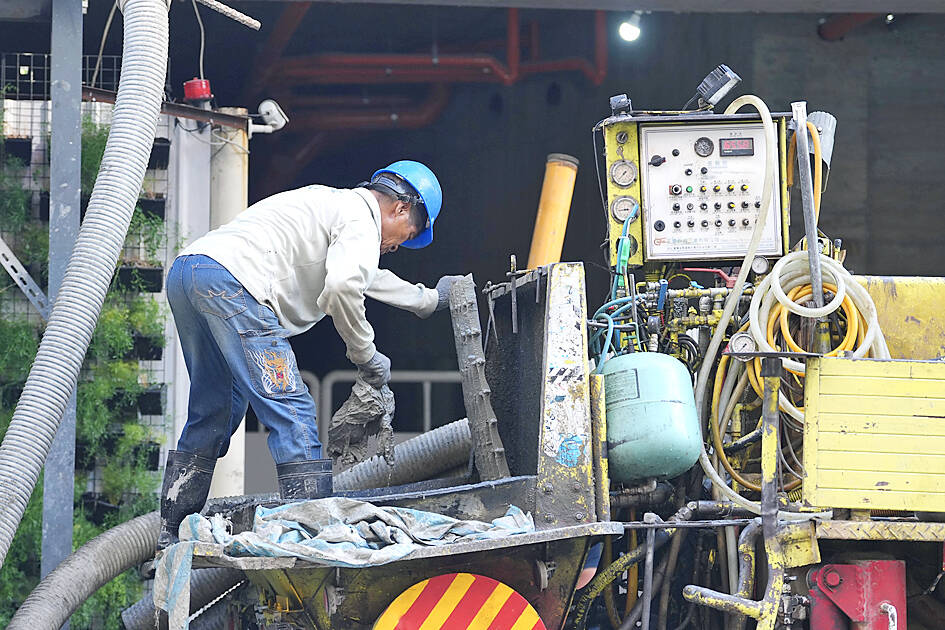Average wages in Taiwan climbed in August, lifted by higher base pay and robust bonuses in the technology sector, the Directorate-General of Budget, Accounting and Statistics (DGBAS) said yesterday.
The average regular monthly wage stood at NT$48,098 (US$1,564), up 2.92 percent from a year earlier, while total monthly earnings — including bonuses and overtime pay — averaged NT$61,646, an increase of 4.38 percent, the DGBAS said.
For the first eight months of the year, the average regular wage reached NT$47,709, up 2.98 percent, the fastest growth in 25 years, DGBAS data showed.

Photo: CNA
Census Department Deputy Director Tan Wen-ling (譚文玲) attributed the steady gains to minimum wage hikes and corporate salary adjustments.
After adjusting for inflation, real regular wages rose 1.12 percent and real total wages increased 2 percent, the largest gains in five and seven years respectively, as consumer prices moderated.
While averages can be skewed by high earners, the median regular wage — a better indicator of typical pay — was NT$38,217, up 2.79 percent from a year earlier.
The real median regular wage rose 0.94 percent, still signaling a modest improvement, Tan said.
By industry, the highest-paying sectors in the first eight months were finance and insurance at NT$77,300, followed by publishing, audiovisual and information services at NT$69,481, and professional, scientific and technical services at NT$58,152, the agency said.
At the lower end, accommodation and food services averaged NT$32,100, and other service industries averaged NT$36,620 — both below the overall average, reflecting a high share of nonstandard employment.
In manufacturing, the median regular wage was NT$36,500, rising to NT$46,000 in electronic components, underscoring the pay gap between the tech and traditional industries, Tan said.
Average total working hours in August reached 172.4 hours, including 8.8 hours of overtime, which generated NT$2,404 in extra pay — a 3.75 percent increase from a year earlier, she said.
Overtime in manufacturing averaged 17.3 hours, marking 15 consecutive months of growth, while the electronic components sector posted 29.6 hours — a 45-year high — fueled by strong demand for consumer electronics used in artificial intelligence applications, Tan said.
In contrast, overtime in auto parts and base metal manufacturing declined by two to three hours from a year earlier, as trade friction between the US and China and tariffs weighed on traditional industries, she added.
From January to August, the number of employees reached 8.51 million, edging up 0.79 percent year-on-year. The accommodation and food services sector recorded the largest gain, adding 18,000 workers, followed by healthcare and social work services, which added 11,000.
In August, the labor market saw an entry rate of 2.41 percent and an exit rate of 2.35 percent, indicating continued labor mobility.
Among those who left their jobs, retirees accounted for 4.8 percent, while about 74 percent had worked for less than three years, suggesting that short-term employment remains prevalent.

PERSISTENT RUMORS: Nvidia’s CEO said the firm is not in talks to sell AI chips to China, but he would welcome a change in US policy barring the activity Nvidia Corp CEO Jensen Huang (黃仁勳) said his company is not in discussions to sell its Blackwell artificial intelligence (AI) chips to Chinese firms, waving off speculation it is trying to engineer a return to the world’s largest semiconductor market. Huang, who arrived in Taiwan yesterday ahead of meetings with longtime partner Taiwan Semiconductor Manufacturing Co (TSMC, 台積電), took the opportunity to clarify recent comments about the US-China AI race. The Nvidia head caused a stir in an interview this week with the Financial Times, in which he was quoted as saying “China will win” the AI race. Huang yesterday said

Nissan Motor Co has agreed to sell its global headquarters in Yokohama for ¥97 billion (US$630 million) to a group sponsored by Taiwanese autoparts maker Minth Group (敏實集團), as the struggling automaker seeks to shore up its financial position. The acquisition is led by a special purchase company managed by KJR Management Ltd, a Japanese real-estate unit of private equity giant KKR & Co, people familiar with the matter said. KJR said it would act as asset manager together with Mizuho Real Estate Management Co. Nissan is undergoing a broad cost-cutting campaign by eliminating jobs and shuttering plants as it grapples

The Chinese government has issued guidance requiring new data center projects that have received any state funds to only use domestically made artificial intelligence (AI) chips, two sources familiar with the matter told Reuters. In recent weeks, Chinese regulatory authorities have ordered such data centers that are less than 30 percent complete to remove all installed foreign chips, or cancel plans to purchase them, while projects in a more advanced stage would be decided on a case-by-case basis, the sources said. The move could represent one of China’s most aggressive steps yet to eliminate foreign technology from its critical infrastructure amid a

MORE WEIGHT: The national weighting was raised in one index while holding steady in two others, while several companies rose or fell in prominence MSCI Inc, a global index provider, has raised Taiwan’s weighting in one of its major indices and left the country’s weighting unchanged in two other indices after a regular index review. In a statement released on Thursday, MSCI said it has upgraded Taiwan’s weighting in the MSCI All-Country World Index by 0.02 percentage points to 2.25 percent, while maintaining the weighting in the MSCI Emerging Markets Index, the most closely watched by foreign institutional investors, at 20.46 percent. Additionally, the index provider has left Taiwan’s weighting in the MSCI All-Country Asia ex-Japan Index unchanged at 23.15 percent. The latest index adjustments are to